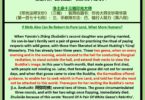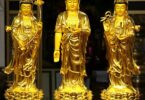It all began when I was a teenager. I can still remembered that day clearly. When my great-grandfather passed away near midnight on his bed, my mother and grandmother asked me and my siblings to continuously burn joss paper (which is not a Buddhist practice), while chanting Namo Amituofo (Homage to, or Refuge in Amitabha Buddha) by his bed. We were waiting for dawn, for the proper setup of the wake at the flat’s void deck. Reflecting back, I had chanted without any question, without even wondering why I should. I was brought up with this unclarified understanding that when a person is about to pass away or had just passed away, I should recite Namo Amituofo to benefit the person.
Five years ago, I was still not a true Buddhist, as I did not came into contact with the Buddha’s teachings. My uncle had been battling with cancer for two to three years. During his last days, he was often hospitalised. While in office one evening, I received a message from my brother, informing me that his condition worsened, that he might not make through that night. At that moment, I naturally accepted the reality that he was dying and started to chant Namo Amituofo silently, as I prepared to leave. Curiously, I did this despite still not knowing who this great being (Amituofo) is. I just believed and hoped that it could be of some help to my uncle in one way or another.
Along the way to the hospital, I continued the recitation – even as I approach my uncle’s bed. I was told by my aunt that the cancer had spread and infected other organs, to the extent that he lost the ability to see and speak. He looked as if he was sound asleep, with the blanket covered to his waist. His breathing was slightly hard. Both his arms were rested by the sides without any life-support apparatus. My aunt leaned over to and spoke softly into his ear, to tell him that I had come to see him. I was standing in front of him, while my siblings were seated or standing some distance away.
When he came around with his eyes open, he suddenly looked shocked, with both his eyes wide open, looking at the ceiling. His mouth opened as if he was trying to speak, but not a word came out. Both his arms were held high, with palms open wide. He tried to lean forward and trembled lightly. Everyone was stunned. I quickly held his hands and spoke silently from my heart to him, telling him gently that he was dying. He gently closed his eyes, lowered his hands and laid down calmly. I thought it was strange, as if he could understand my intention. No one knew I was reciting Namo Amituofo all the while. He might had seen something or someone – which we were not able to see. Till today, this incident remains fresh and unforgettable in my mind.
Today, I feel fortunate and blessed, to be able to encounter and learn about the simple yet vastly profound Pure Land teachings (through class on the Amitabha Sutra, and through group practice and discussion sessions every Friday with Pure Land Practice Fellowship), with guidance from Brother Shi’an, with his unceasing and unconditional offering of time and effort. From the class, through further understanding on the Amitabha Sutra and Amituofo’s 48 great vows in the past two years, I realised that my uncle definitely must had seen Amituofo, whose radiance surrounded and amazed him, that he reached out to embrace. How wonderful and meritorious the faithful recitation of Amituofo’s name is, which must have invoked his arrival, which comforted him. In the end, my uncle passed away very peacefully. If you have doubts about this, you would need to experience it personally. It is however beyond belief for me – as real as being right here right now. Namo Amituofo.
– A Novice Practitioner from Pure Land Practice Fellowship (July 2010)





